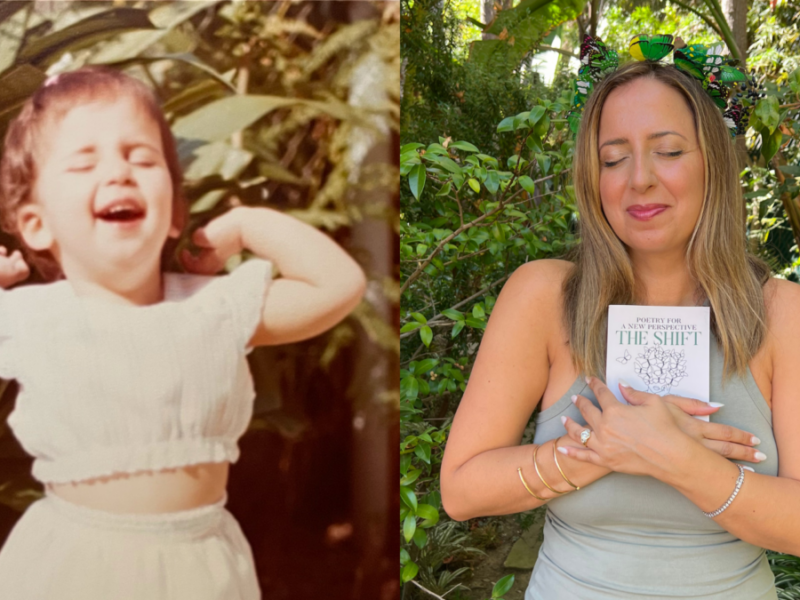Sierra DeMulder Talks Taking Risks and Trying Out Fiction
A two-time National Poetry Slam champion, a four-time published author (The Bones Below, New Shoes on a Dead Horse, We Slept Here, Today Means Amen), and an internationally touring poet, Sierra DeMulder uses her platform to be both an educator of poetry and an advocate for mental health. She regularly tours, performing at high schools, colleges, prisons, churches, and homeless shelters.
Her favorite poets include Sharon Olds, Ada Limón, and her dear friend Hieu Minh Nguyen. DeMulder first discovered Olds in 2009.
“As I was writing my first collection of poetry,” she says, “someone suggested I read Olds and gave me a copy of her book, The Dead and The Living.”
Later, she discovered Limón when she was up late perusing the Poetry Foundation Website.
DeMulder knows well that one of the best ways to become a better writer… is to read.
“Before publishing my first book, I wasn’t well-read in poetry, and I had never stopped to think about how my poems looked on the page. Now, playing with line breaks and stanza form is one of my favorite things about writing.”
But she’s concerned with more than how poems read on a page, and her involvement in spoken word is no secret. DeMulder is a co-founder of Button Poetry, the largest YouTube channel for poetry in the world. She feels that spoken word and written poetry are very close cousins.
“I always keep an audience in mind as I write, but I can take different liberties if I know the audience will be visually consuming my work versus audibly.”
She finds the processes of writing both written poetry and spoken word quite the same, save a few small nuances.
“I write almost exclusively on my computer,” she says. “I find that I edit too much as I go to use pen and paper.”
At the onset of her career, DeMulder mainly wrote about her identity as a woman and her experiences struggling with mental health issues.
“I gained a lot of readers from folks who saw their story retold through my poems,” she says. “I am grateful my art could act as a mirror for so many.”
But years later, she wanted to show a different side of their experience. She wrote her critically acclaimed, and arguably, most well-known poem, “Today Means Amen” to show that “regardless of what you’ve been through, you made it here to this moment. It is meant to shine a light through, not just on, some of the harder issues of life,” says DeMulder. Today Means Amen became the title of her wildly popular 2016 poetry collection.
She says she doesn’t read all her reviews, but DeMulder definitely takes a look at them from time to time.
“There can be a fine line between wanting constructive feedback and wishing you could change a book that’s been published for a couple of years,” she says. “While I’m sure I’ve made thousands of mistakes, both creatively and personally, I’d rather not focus on the past. I can’t unpublish that book. I can’t grow as an artist any faster than I did. I can only show up for now and set intentions for the future.”
DeMulder says she finds writing both energizing and exhausting, but the key is to show up anyway and to be constantly willing to outgrow ourselves.
“I think your writing evolves as you (the person) evolve. I try to be very keen on self-reflection and emotional/spiritual growth.”
She also continually pushes herself as a writer by asking “Do I really mean that? Am I falling back on old triggers? Am I writing that because I know it’s easy and safe?”
She admits that these days she sometimes struggles to take new risks in her writing. “I feel as though I was more comfortable taking risks in my work when I was younger and I did not pay my bills with poetry. I am currently working on returning to that place of untethered, fearless creativity.”
After serving as curriculum director of the Gustavus Adolphus College Institute of Spoken Word and Poetry Slam, DeMulder finds working with young writers inspiring.
“Young writers are so eager and grateful and experimental. They remind you what your own awe feels like. It feels very mutually beneficial in that way. While this summer camp is no longer in operations, I can confidently say that running it for the past seven years was the most rewarding accomplishment of my career. Toni Morrison always tells her students ‘your real job is that if you are free, you need to free somebody else.’”
While young writers have a fresh and eager perspective, they also face an interesting challenge as social media plays a larger and larger role in poetry, and literature overall.
“For better or for worse (depending on who you ask), social media is now forcing writers to consider a different level of accessibility in both craft and persona. There is a new immediacy in both content and message,” says DeMulder. “Ultimately, I think anything that leads more young folks to read poetry is a good thing. I like considering myself a ‘gateway poet’ who hopefully opens the doors for new readers to find authors like Ada Limón.”
Though poetry is her bread and butter, DeMulder has a soft spot for fiction. She is currently reading The Mothers by Birt Bennett and says the first book that made her cry was Speak by Laurie Halse Anderson. DeMulder even dabbles in fiction herself, saying, “Personally, I’d like to publish across genres. I am working on my first novel now.”
Regardless of genre, DeMulder stresses the importance of just showing up for yourself and your craft. “Articulating your story is an act of self-empowerment that too few give to themselves.”




